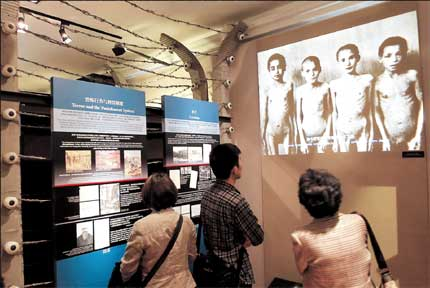Art icon Peter Max seeks boyhood 'nanny' in city
 0 Comment(s)
0 Comment(s) Print
Print E-mail Shanghai Daily, April 20, 2012
E-mail Shanghai Daily, April 20, 2012
|
|
|
Visitors examine one of the heartbreaking pictures on display at an exhibition telling the story of the Auschwitz-Birkenau concentration camp that opened yesterday at the Shanghai Jewish Refugees Museum. The exhibition, which was jointly produced by Poland's Auschwitz-Birkenau State Museum and the Shanghai museum, will remind visitors of one of the darkest chapters in human history when, during World War II, Nazi Germany carried out a sustained campaign of racial extermination of the Jews, killing more than 6 million. Among them, at least 1.1 million were murdered in the Auschwitz-Birkenau camp. |
Peter Max, a 74-year-old renowned artist in the United States, is searching for a Shanghai "nanny" who took care of him and taught him to draw pictures when he took shelter as a Jewish refugee in the city some 65 years ago.
"When I was three years old, a nine-year-old young girl came to my home in Shanghai as she was hired by my mother to be my babysitter," said Max from New York during a video conference held yesterday at the Shanghai Jewish Refugees Museum.
"My nanny was only six years older than me, and I always treated her as a sister. I still remember how she held my hands, drawing circles and circles on papers to teach me to draw pictures," said Max.
The little girl had the techniques to teach him because her father was a painter, Max added.
Max was born in Berlin, Germany, in 1938 and was taken by his family to Shanghai to take shelter as refugees from the Nazis two years later. Max left Shanghai in 1949, but he has never forgotten the days he spent with his little nanny.
Max recalled that his nanny would take him outside to draw under the sun and draw the sky full of stars at night, which made him a "good artist" since he was a very young boy.
The nanny taught him to use multiple colors to draw the sun, the sky and the moon, which helped him grow into a world-famous artist noted for using bold and harmonious infusion of color, particularly as a pop artist in the 1960s.
The Shanghai girl would throw away the paintings after the boy finished and ask him to draw another one so he could develop his skills, Max recalled.
"But unfortunately I can't find even one of her pictures in the albums and I didn't know her name," said Max. "I always called her 'Umba' but I don't know whether it was her real name or just a nickname. If she is still alive, she should be over 80."
He said he used to live on "Tangshan Road" in Shanghai, a road on which an Indian temple and a Chinese temple were located on the two sides.
Officials with the Shanghai Jewish Refugees Museum said they would help the artist try to find his nanny. They are starting to look for a woman called Weng Bo on Zhoushan Road, and Max said he would visit Shanghai in October to look for his nanny and hold an art exhibition.
Max was among 30,000 Jewish refugees who fled to the city from their homelands from 1933-1941. About 18,000 of them settled in the "designated area for stateless refugees" in the city's Tilanqiao area in Hongkou District to live with local residents.
Dubbed a cultural icon in the US, Max has painted many portraits for celebrities in music, sports and politics. In the conference, he displayed portraits for US President Barack Obama.







Go to Forum >>0 Comment(s)